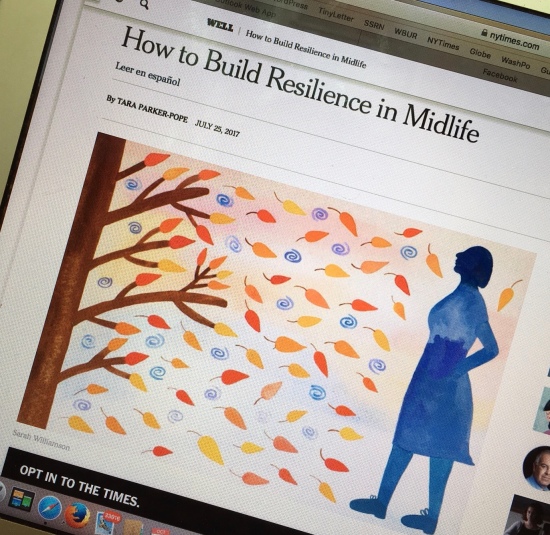
For many people who have found this blog because of very bad work experiences or career setbacks, the topic of resilience often enters into discussions of recovery and healing. Of course, there’s no shortage of books and long articles about building resilience, and they are certainly worth checking out. But sometimes less is more. Toward that end, I strongly recommend an excellent short piece that appeared over the summer, “How to Build Resilience in Midlife,” by New York Times health columnist Tara Parker-Pope.
Drawing upon the work of resilience experts, she compactly pulls together seven main points of advice:
- “Practice Optimism”
- “Rewrite Your Story”
- “Don’t Personalize It”
- “Remember Your Comebacks”
- “Support Others”
- “Take Stress Breaks”
- “Go Out of Your Comfort Zone”
If this topic is important to you, then I strongly recommend reading the full article. If you give it 10 minutes of your time, then there’s a good chance you’ll want to save it or print it out. It invites deeper contemplation. Especially for those of us who have been around the block a few times, it’s a great starting place for understanding the keys to building resilience later in life.
For more
For those who would like to dive deeper into this topic, these sources may be helpful:
- The American Psychological Association’s “The Road to Resilience” page;
- From the Greater Good Science Center at UC-Berkeley, Kira Newman’s “Five Science-Backed Strategies to Build Resilience“; and,
- From the Harvard Business Review, positive psychology expert Martin Seligman’s “Building Resilience.”
Also, do a search on “building resilience after trauma.” You’ll find a wealth of informational resources.
Increasing resilience can be a mixed blessing in a dis-empowering, stressful workplace. More resilience can lead to feeling strong enough to keep trying to plow through a toxic situation. Once you are out of that situation, however, then resilience is an unabashed benefit.
-Steve Moffic, M.D.
I read the full article. Through personal and professional experience, I can’t help but think there should be talk about stages of resilience and ‘vantage’ points as well. I think it can be agreed that circumstances (e.g., access to savings, reliable car, spouse’s insurance plan, health, supportive family) certainly contribute to the opportunity to develop or access resilience. However, it’s when those things aren’t so readily available that resilience can be (maybe even needs to be) influenced by the kindness and care of others – often strangers.
Great post. Thank you David. I enjoyed the articles, but struggled with Martin Seligman’s “Building Resilience” article where he equates trauma with failure. I’m not sure if I’ve interpreted his article correctly (?), but I don’t see this as being helpful to building optimism and ultimately recovering from trauma.